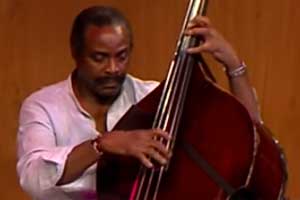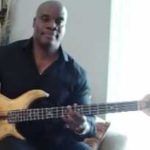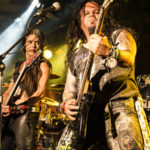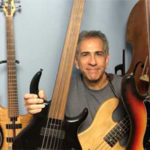As part of our Blake Brothers tribute, Alex covers the gigs with Sun Ra, Dizzy Gillespie, Manhattan transfer and lots more!
Exclusive interview with FBPO’s Jon Liebman
August 27, 2012
Originally from Panama, Alex Blake became a trumpet player as a young boy, before switching to bass at the encouragement of his father. Beginning with the Ampeg “baby bass,” Alex became immersed in the Latin styles of music, playing salsa, bossa nova and other forms, while developing his signature technique of playing the bass.
When the Blake family moved to New York City, young Alex was introduced to some of the masters of Latin, Puerto Rican and Afro-Cuban jazz. By age 12, Blake was performing with Monguito Santamaria, Machito (Maria Bauza), Carlos “Patato” Valdez and Celia Cruz. At 16, he was touring with Sun Ra, establishing a reputation as an emerging and formidable star bassist. As his name became more well known, Alex joined Dizzy Gillespie’s band and soon began working with jazz icons Freddie Hubbard, Art Blakey, McCoy Tyner, Stan Getz, Pharoah Sanders and many others. As his ability to adapt to virtually any style of music became more apparent, Alex landed the gig with Manhattan Transfer, with whom her remained for over sixteen years.
In addition to being a sideman, Alex is also known as bandleader. To date, the Alex Blake Quartet has released two CDs, In Motion (1990) and Now is the Time (2000). Alex continues to perform actively in major festivals and venues throughout the world. In 2011, he received a Lifetime Achievement Award from the Central Brooklyn Jazz Consortium.
FBPO: I just had a nice conversation with your brother Russel. I learned a lot about your father, your upbringing and your family. It’s a very interesting story. So if we could, I’d like to start from the beginning. What do you remember about Panama?
AB: I left Panama when I was 7 years old, but I still remember it a bit. When I was coming up, my father played with one of the great musicians of Panama, Victor Boa. I guess he was the equivalent of Duke Ellington in this country. I used to go to rehearsals with my dad. He bought me a toy trombone and I used to play with him. I would go to the rehearsals and sit down with the rest of the guys. They would put out a music stand for me, I’d pick up my toy trombone and play alongside my dad. Those rehearsals marked my first introduction to music. I would sit back and listen to the guys and they would let me get up on stage and sit next to my dad, put some music on a stand for me and I swore I was playing! I thought I was playing along with the big band.
FBPO: I understand your first “real” instrument was the trumpet.
AB: Yes. We first came to the United States in 1958, when I was 7 years old, and my dad started me off on trumpet. I really didn’t want to play the trumpet, but that was the instrument he started me off with. His whole thing was that I would learn treble clef. I played trumpet for a couple of years, but it wasn’t an instrument I really was interested in playing.
FBPO: How did you end up with the bass?
AB: That was my father’s doing. Actually, it was the guitar that I really loved, especially while listening to the Beatles and the Stones and the other bands in the early ’60s. I even tried to build a guitar out of pieces of wood I got from a nearby lumberyard, totally destroying my father’s tools in the process! He saw that and he knew that playing guitar was something I wanted to do. One day, though, my father came home with an Ampeg baby bass. I looked at the bass and, not thinking, I said, “Who’s going to play that?” And he looked at me and he said, “Who do you think?”
FBPO: What was your reaction to the baby bass?
AB: I really didn’t want to play the bass at all. I didn’t like the bass. It wasn’t something I was interested in. I was interested in playing guitar. What I didn’t know at the time when I was a kid, when my father was playing with all of these big bands, was that he used to have a little book and he would ask bass players questions about fingering and pizzicato and so on. He had this whole idea all this time that eventually I was going to learn the bass, that he was going to be teaching me the bass and he would have these pointers.
Every day we would go in the basement and he would give me an hour or two-hour lesson. Even though he never played the bass, but because of the questions he had asked so many bass players, he could give me pointers in terms of what to do. He would play the trombone and we would find the notes. He showed me how to tune the bass and so on. All of these little things led up to me learning the instrument. As I said, I really wasn’t that interested in the instrument. I was playing it because my dad wanted me to play it. In fact, I really hated the bass. Even so, I started becoming proficient with it in terms of knowing what was where and so on.
FBPO: How about the guitar?
AB: My father had a guitar and every day before he went to work, he would hide the guitar in the back of the closet. When I came home from school, I pulled that guitar out and started learning how to play it. The guitar actually helped me out in terms of learning positions on the bass. That’s how I kind of graduated in terms of learning more about the bass.
FBPO: Your dad seemed pretty set on both you and Russel playing the bass.
AB: Yes he was! He would give us a lesson early in the morning. Russel must have been five years old or something, but our dad would give me a couple of lessons and I would have to have those pages together by the time he came home that evening.
Eventually, I started falling in love with the bass. I started really liking the instrument and I started putting the guitar down. I would come home, practice it and, eventually, I got into the instrument. One thing about my dad was that he was always stressing to us that we should approach the instrument differently to have different concepts of playing the instrument, to just have a different approach to the instrument.
FBPO: What about the electric bass? Wouldn’t that have been an obvious choice for you, given your love for the bass and the guitar?
AB: No, at the particular time I wasn’t even thinking about the electric bass. The Ampeg baby bass was like a cross between an upright and an electric bass. I was basically playing Latin music. I started playing professionally, probably around 12 years old. I was playing with a lot of local Latin bands because I come from Central America, Latin country, so all of the music my father played was Latin music. When I started playing, he was able to tell a lot of the musicians, “Listen, my son is a bass player. I’d like to try to get him in. Would you mind calling him for a gig?” And that’s how I started.
I started with the local bands first and then people started knowing my name. Eventually I started working with some of the top Latin bands, like Monguito Santamaria, Mon Rivera, Charlie Palmieri and a lot of the major Latin bands at that particular time when I was coming up.
FBPO: Were you playing the baby bass exclusively?
AB: Yes. The upright actually didn’t come until much later and the electric bass even later than that. The electric bass was not a thing for me at the time. I was playing with one of the major Latin musicians, a guy named Kako, who was the equivalent of Tito Puente at the time. He had a band called Kako & his Orchestra and was very well known in the Latin scene because, remember, in New York back in the early ’60s, Latin music was really big.
Kako’s band had some great Latin musicians and some great jazz musicians. He would have people like Pat Patrick, Manny Duran, Bobby Brown, Ray Maldonado… These were guys that not only played on the Latin scene, but also played on the jazz scene, with people like Sonny Stitt and Dizzy Gillespie.
Kako had a big band, as well as several smaller groups. One time, when I was about 15 or 15 and-a-half, I was playing in his sextet, which included Pat Patrick and Ray Maldonado. One week Pat came to me and said, “Sun Ra is looking for a bass player to go on tour for the summer. Would you be interested?” So I said, “Sure!” I had never been to Europe and that was a big thing for me. It’s funny because I had no idea who Sun Ra was and I didn’t know what kind of music it was going to be.
The following week, Ray Maldonado comes to me and he says, “Dizzy Gillespie is looking for a bassist. I told him about you. Would you be interested in doing the gig?” and I said, “Sure.” At that particular time, I was not aware of the journey I was about to take or some of the great artists that I was working with. I knew about the great artists in Latin music, but I didn’t really listen to jazz a lot. I was just getting familiar with it with certain local jazz bands that I was playing with.
When I told my dad, my dad knew who these people were. He knew who the artists were and he was ecstatic when I said, “Okay, I’m going to go out with Dizzy Gillespie and work.” For me, it was like, “Well it’s just another person I’m going to work with.” Again, I didn’t know the magnitude of the person I was about to work with.
FBPO: Tell me about the Sun Ra gig.
AB: I need an upright bass, so I got a hold of one from my high school teacher. I go to Sun Ra’s with that bass, the door opens up—and again, I had no idea of Sun Ra or the music or what I was in store for—so the door opens up and there are planets hanging. It was a big townhouse. I walk into the main area. There was a huge foyer and a big living room with all these music stands. One of the things that I always loved was astronomy. I always thought I was going to be an astronomer. So when I saw this I was like, “Oh, wow, this guy must be really cool.” So Sun Ra comes in and I meet him and the music is something totally different. I had never played anything like it before.
FBPO: Do you happen to remember how was he dressed? I’m just curious.
AB: Sun Ra was dressed as he always dressed. Let’s just say it wasn’t normal dress that someone would be used to. Sun Ra just had his way of doing things. In fact, we’d go up on stage to play and he would say, “Everybody put on your spacesuits.” It was really an experience working with him.
FBPO: What was that first rehearsal like?
AB: Well, I walk in there, and there’s this staircase with a banister and here comes Sun Ra. He’s walking down like he’s a king or something. I’m looking at this cat and I really don’t know who he is. So he walks down, he jumps on the Farfisa organ that he had there, pulls some music out, and it’s Marshall Allen, John Gilmore, Scott Patrick, Danny Davis, Kwame Hadi, Avshalom Ben Shlomo, Lex Humphries… There were a lot of great musicians and, again, I’m just becoming familiar with a set of musicians on another level of music that I was not aware of. I was just learning about all of that stuff.
That rehearsal turned out to be a recording, and that recording is called My Brother the Wind, Vol. II. It’s a classic album now. That was my first introduction to Sun Ra. I went out to Europe with him for a couple of months, did that, came back home and then started working with Dizzy Gillespie.
FBPO: I bet that was an interesting experience, too.
AB: Yes it was! I was playing with Kako’s sextet when I met Dizzy. When he first walked in to the club, I thought he looked like this person I saw in a picture on one of my father’s albums. Then he walks up up on stage and he says to me, “Hey, what’s happening, kid?” and turns around and starts to play and I’m seeing his cheeks. He looked like an alien! When he put the trumpet to his mouth, it was an unsual sight if you were standing behind him to see how his neck and face and cheeks expanded. All the guys are laughing at me because I’m so surprised. I mean I was always the youngest kid in the band.
I’ve been blessed to play with a lot of great trumpet players at that time, but I never saw that or heard anyone play like Dizzy. He had a completely different sound and style. I kept that gig for about two-and-a-half or three years.
After Diz, I started working with Clark Terry. Then I worked with Woody Shaw and I worked with Freddie Hubbard for about two-and-a-half, three years. Things just started going from there. At that time, I was working with a lot of different people. There are a lot of people that sometimes I can’t even think of their names.
FBPO: Tell me something about Dizzy Gillespie that most people may not know.
AB: As a human being, Dizzy was a great guy. He was a great humanitarian and was involved in a lot of different causes, helping a lot of people. He was quiet about it with certain things, but he was vocal about civil rights and he was vocal about many different things that were happening during that particular time. He did a lot of things for the U.N., helping other people and a lot of different organizations.
He wasn’t just a musician. He was a politician in certain ways, not totally involved in politics as someone who is going to go out there and speak all of the time, but he was involved with politics in a quiet way, by distinct things that he did. When it was time for him to be vocal, he would be very vocal.
Being with Diz, there was a lot to learn about life. Not that you didn’t learn certain things from your parents or people around you, but he was another person. He had different experiences and different stories and so on to tell.
As a musician, I mean, what can I say? Being with Diz was like going to a university. It was going to the best university that you could go to. I learned so much musically from him. His patience and his wisdom were things I tried to pick up and tried to emulate, sometimes in my own particular way.
FBPO: Let’s jump ahead a little bit and switch gears. Tell me about the Manhattan Transfer gig. You were with them for quite a while.
AB: Yeah, I got the gig from Brian Avnet, whom I met through a friend of mine, Buddy Williams, one of the great drummers. Buddy was playing with Bette Midler and Brian was actually a roadie for that gig. Eventually, when Brian became the manager for Manhattan Transfer, he called me and said they knew about me, he’d been telling them about me and they wanted me to be in the band. I started with them in 1979 and worked with them for sixteen years.
FBPO: It must have been an enjoyable gig.
AB: Oh, yeah. They were a great bunch of people to work with. I loved working with them, and we had a great time. What I love about the music is that it wasn’t just one style of music. They did everything from rock to pop, to jazz, to Latin, to mambo, to everything. That’s one of the great things that I loved about working with them. They were great singers, too. What they were doing hadn’t been done before. They were more of a takeoff on Lambert, Hendricks & Ross, except that it was updated for another time. It was great to work with them. I had a really great time.
FBPO: Well that’s a good segue to my next question. Playing upright and electric, going from Latin to jazz to rock and fusion, etc., you’ve made quite a name for yourself in so many different types of music circles. Do you have a passion for any one style over the others?
AB: That’s almost like saying, “Do you like the upright bass better than the electric, or the electric better than the upright?”
FBPO: Well, that’s a legitimate question, too!
AB: Music is universal. Music is a language. Obviously, I grew up playing Latin music. That was my first form, so I have a passion for Latin music, but I also have a passion for jazz. I have a passion very much for that music.
It’s difficult to pinpoint which one I love the most because I love all of it. It’s all the language that you can communicate with all people. So it’s difficult for me to put a finger on this or that because I love playing rock, I love playing fusion and so on. I guess there are certain forms of music that I like playing a little bit more than others, but it’s hard to say which one I really love the most. I really like playing all of it, so I try to play all of it to the best of my ability.
It’s funny because you were talking about the electric bass. I started playing that a little later on and I was doing a lot of gigs with it with different people, but the upright was still dominant at the time. When I got with Billy Cobham and Lenny White, that was when I got into the electric bass because that was just sort of fusion in one sense, or fusion because Sun Ra was already doing fusion music in a whole other sense. This is another sense of what they were doing. They were taking rock and jazz and applying and putting them together, so it was called fusion. In fact, the record companies didn’t even know what to call it back then!
FBPO: Billy is from Panama also, as I’m sure you know. Did your families know each other?
AB: No, we didn’t. It’s funny because I met Billy when I was playing at the Village Gate. He said, “Listen, man, I’m going to put this band together one day and I have you in mind.” It wasn’t until a couple years later that we actually worked together. In fact, we lived around the corner from each other. I had just gotten home off the road from playing with McCoy Tyner, I walked into my place and my phone rings and it’s Billy Cobham. He was putting a band together to go out on tour and asked if I would be interested. That’s how that started with Billy Cobham. It wasn’t until later, as we got to know each other, that I found out that he was from Panama also. Unfortunately, our families didn’t know each other.
FBPO: What’s keeping you busy these days?
AB: Basically, I’ve been working with Randy Weston for many years, off and on, and I’ve been working with my own group. I’m getting ready to go into the studio to record my next album, which is going to be basically a mixture of fusion. It’s going to be electric, it’s going to be acoustic, it’s going to be a little bit of live. So, hopefully I’ll finish that sometime in September and it’ll be out sometime in October.
FBPO: Who’s going to be on it?
AB: I have Victor Jones on drums, I have a guy named Chacho Ramirez who plays percussion and Chris Hunter on saxophone. Chris is one of the great sax players. He’s played with Gil Evans, he’s played with so many people. I have a great young pianist named JaRed Jacobs and I might have some other artists, as well. I might have Arturo O’Farrill play one or two tunes. There’s going to be a couple of different people.
FBPO: We’ll watch for it. I mentioned at the beginning of this conversation your brother, Russel, that I talked to him the other day. He is a formidable bass player in his own right.
AB: My brother is incredible.
FBPO: Have you two gotten to collaborate on anything? Have you ever done much together?
AB: It’s really funny. It’s something we’ve talked about and it’s something we want to do. We’ve played together in different situations, but we haven’t done that in a long time. He’s on the West Coast and I’m on the East Coast, which makes it a little harder. Hopefully before the year is out we’ll do an album together.
FBPO: You be sure to let me know! What else would you like to do in the future? You’ve done so much and you’ve played with so many people. What else would you like to do that you haven’t already accomplished?
AB: That’s kind of a hard question because I’d like to be able to continue doing what I am doing in terms of playing music and making a lot of people happy with the music that I’m playing. There are a lot of things that I’ve done. I guess there’s a lot more that I would like to do musically in terms of experimenting. I think right now, I’d just like to continue playing and writing some great music, trying out some different things, musically.
FBPO: What would you be if you weren’t a bass player?
AB: I would be an astronomer or an aeronautical engineer. When I was a young kid that was something that I was aspiring to do. I was into anything that had to do with astronomy, designing rockets, and so on. In fact, I had designed a space station when I was a kid and sent it to the White House, to Kennedy, and got an answer back saying, “Thank you for your design.” That is what I would’ve wanted to be. Basically anything that had to do with rockets or jets, planes, anything like that. That’s my other passion.
But my dad always had a thing about me playing the bass. He always had this thing about how I’m the first-born son so he wanted me to play bass because he thought the bass is the most essential part of a group. He said, “It’ll always keep you working. It’ll take you around the world.” And it has.




